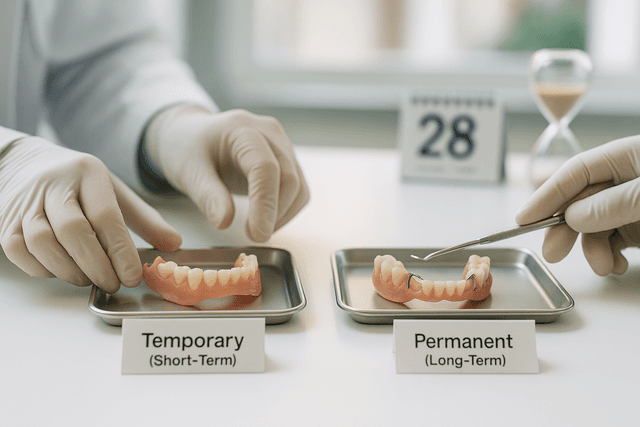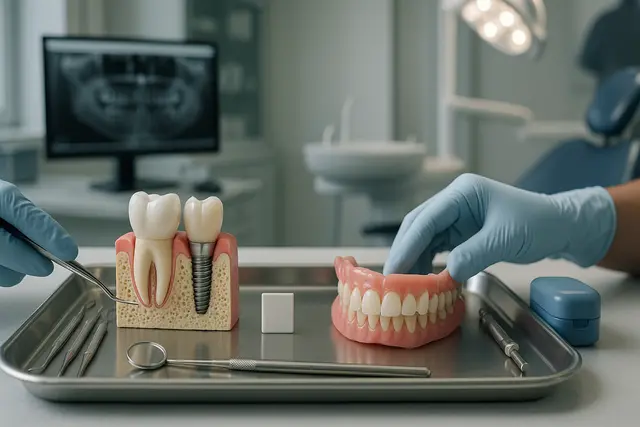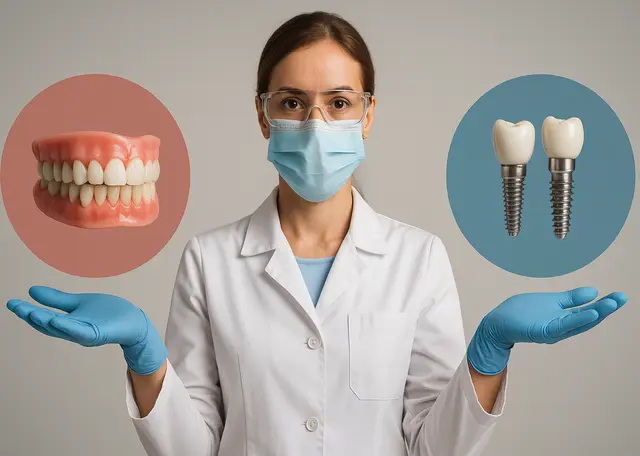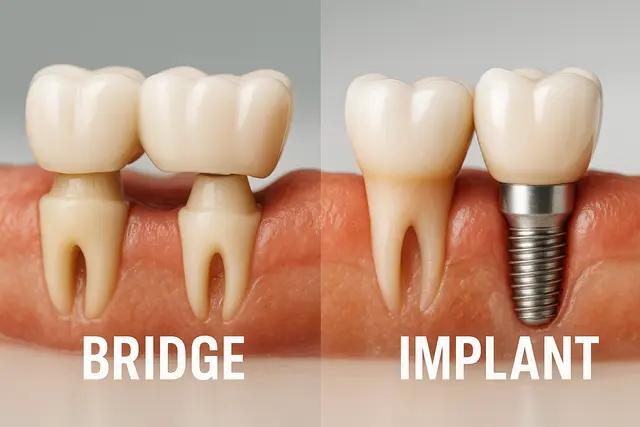Prosthodontics
4 min read
Sep 22, 2025
Are Partials Permanent or Temporary Solutions?
Losing teeth can impact everything from how you chew to how you feel about your smile. Dentures offer practical solutions, but not all options are the same. Understanding whether partials are a temporary fix or a lasting choice helps you make the best decision for your dental health.

Missing teeth can really mess with more than your smile. Chewing, speaking, and confidence all take a hit. Luckily, dentures have your back. But not all dentures are created equal, especially when you're trying to figure out if partial dentures are a permanent solution or just a temporary fix.
Denture Options for Missing Teeth
Dentures are removable prosthetic devices designed to replace missing teeth.There are two main types: complete dentures and partials. If you're missing several teeth but still have some natural teeth holding on, partial dentures are likely your go-to.
Partial dentures fill gaps with one or more artificial teeth attached to a gum-colored base. Sometimes, they include a metal framework or acrylic depending on the material used. These devices are designed to replace missing teeth while keeping your remaining teeth in place and your bite aligned.
What Makes Partial Dentures Different
Partial dentures are ready to help when you're not quite ready for a full set of teeth replacement. It hooks around your remaining teeth, offering both support and a more natural appearance. They’re often a good choice for people who need a flexible option while figuring out a permanent solution.
There are several types of partial dentures depending on your lifestyle, budget, and long-term dental care goals:
Removable partial dentures are common and easy to clean, making it user-friendly.
Custom partial dentures may cost more but fits like a glove.
Temporary Dentures vs. Permanent Dentures
Here’s where things get interesting. If you’re waiting for healing after a dental procedure like a tooth extraction, you might be fitted with temporary dentures. Temporary dentures are often called flippers because they’re lightweight and pop in and out easily. They're used as a temporary solution to fill in gaps while gums and bone settle.
Permanent dentures, on the other hand, are considered permanent because they're made to last for years. They are made with stronger materials and built for everyday use. They're usually designed after your gums and remaining teeth have healed and stabilized.
Still, note that temporary dentures may feel less stable, and while they're affordable, they're not built for the long haul. That’s why many people use flippers or interim dentures only while waiting for permanent partial dentures or dental implants.
Dentures Are Made to Fit Your Life
The denture process starts with a consultation. Your dentist will take impressions of your mouth to design dentures made just for you. Temporary dentures are made quickly and can be adjusted as needed. Permanent dentures are often more detailed, ensuring a comfortable fit and natural look.
The type of denture you need depends on several things:
How many teeth you’ve lost
The shape of your gums
Your dental goals
Dentures can be made from acrylic, metal, or a combination. Dentures are strong, but even permanent ones may eventually need adjustments.
What the Dentist Recommends
A skilled dentist will help you weigh the pros and cons. If you're missing several teeth and your gums need time to heal, they'll probably suggest temporary dentures first. If you're looking for a more durable fix, permanent dentures or dental implants may be better.
However, not everyone is a candidate for implants due to bone health or budget. That's where partials shine as a flexible, removable option that still gives you functionality and a full smile.
Removable or Not: What to Expect
Removable partial dentures are popular for good reason. They're affordable, easy to maintain, and can be replaced or upgraded later. If you're not ready to commit to permanent dentures or implants, a removable partial gives you breathing room.
Keep in mind, though, dentures are often part of a larger dental plan. You may start with temporary dentures, move to a removable partial, and later invest in implant-supported dentures. The journey looks different for everyone.
Why Temporary Dentures Are Often Needed First
Since temporary dentures are often used right after tooth loss or extraction, they play a big role in your recovery. They let you go about your day without feeling self-conscious or struggling with chewing. They also protect your gums and help maintain the spacing between your natural teeth.
Note that temporary dentures are not a substitute for permanent dental procedures. They’re more like a comfortable placeholder while you plan the next step.
Dentures Replace More Than Just Teeth
Whether you're using a flipper, a removable partial, or investing in a full permanent solution, dentures replace more than just teeth. They restore function, protect your gum health, and give your facial structure support. Dentures are designed to improve your daily life, not just your dental appearance.
Choosing the right type of partial depends on your needs and comfort level. Some people prefer the flexibility of a removable dental appliance, while others want the security of implant-supported dentures. No matter what, dentures available today offer more options than ever before.
Dental Services That Help You Decide
You don’t have to figure it out alone. Regular dental checkups and consultations with dental professionals will help you stay on track. A family dental practice will offer guidance tailored to your smile, health, and budget.
From taking impressions of your mouth to guiding you through dental procedures, your dentist will make sure your dentures are designed to fit comfortably and last. Whether you’re going with a temporary fix or a permanent restoration, dental care plays a huge role in keeping things smooth.
Are Partial Dentures Permanent or Temporary?
Partials can serve as either temporary or permanent solutions depending on your dental needs. Temporary partials, often called flippers, are lightweight and used right after extractions or tooth loss to fill gaps while gums heal. Permanent partial dentures, however, are designed with stronger materials, fit more securely, and can last for years with proper care.
What Is the Difference Between Temporary and Permanent Dentures?
Temporary dentures are made quickly, usually from lighter acrylic, and provide short-term comfort while you wait for a permanent solution. They may not fit perfectly and can feel less stable. Permanent dentures, by contrast, are customized for your mouth once healing is complete. They use durable materials, look more natural, and offer a better long-term fit and function.
Why Would a Dentist Recommend a Temporary Denture First?
After extractions or sudden tooth loss, your gums and jaw need time to heal before creating a permanent denture. A temporary denture protects the area, maintains space between teeth, and helps you chew and speak more comfortably during recovery. Once healing is complete, your dentist can create a permanent partial or recommend implants for a lasting solution.
What Factors Influence the Choice Between Partials and Other Options?
Your dentist will consider how many teeth are missing, the condition of your gums, and your long-term dental goals. If implants are not possible due to bone density or cost, partial dentures are a flexible and removable option that restore both function and appearance. They may also be combined with a broader dental plan that includes implants or bridges later on.
Read Next
Related Posts

Prosthodontics
Implant vs. Dentures Pros and Cons: A Deep Dive into Modern Solutions
Missing teeth can impact more than just your smile, they can affect how you eat, speak, and feel about yourself. Fortunately, modern dentistry offers two leading solutions to bring back both function and confidence: dentures and dental implants. Understanding the pros and cons of each can help you make the choice that fits your needs, lifestyle, and budget.
7 min read
Oct 17, 2025

Prosthodontics
Full Mouth Implants vs. Dentures: Which Is Better for You?
When it comes to replacing missing teeth, the choice between full mouth dental implants and dentures can be overwhelming. Each option has its own set of benefits, limitations, and long-term considerations, making it essential to understand what works best for your needs, health, and lifestyle.
5 min read
Oct 17, 2025

Prosthodontics
Tooth-Supported Bridge vs. Implant Comparison: Benefits, Drawbacks, and Insights
Deciding between a dental bridge and a dental implant can feel overwhelming, especially when both options promise to restore your smile and improve oral function. Each solution comes with its own set of benefits, considerations, and ideal use cases, making it essential to understand how they compare before choosing what’s right for you.
6 min read
Oct 17, 2025
Don’t have time to research every dentist around you?
See why 30k+ patients trusted us